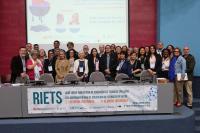Webinar “Climate emergencies and their impacts on global health and national health systems”: why do we need to talk about this?

Climate emergencies—extreme heatwaves, floods, droughts, and storms—are mainly caused by rising concentrations of greenhouse gases, especially carbon dioxide (CO₂), in the atmosphere and have significant impacts on human health. These increasingly frequent natural disasters, resulting from deforestation, fossil fuel burning, and other human activities, lead to death, physical injuries of varying degrees, and psychological stress for affected populations. They also worsen health problems among the most vulnerable groups, placing direct and indirect strain on health systems. In this context, it is urgent and essential to establish policies to reduce global warming and find ways to strengthen and prepare national health systems for new demands.
To address this issue, the Network of Technical Health Schools of the Community of Portuguese Language Countries (RETS-CPLP) is organizing the international webinar “Climate emergencies and their impacts on global health and national health systems,” featuring guest researchers Alexandre Pessoa Dias, from the Joaquim Venâncio Polytechnic School of Health (EPSJV/Fiocruz) – Brazil, and Tatiana Marrufo, from the National Institute of Health (INS/MISAU) of Mozambique. The event will take place on June 2 in Lisbon, during the 5th Ordinary Meeting of the Network, and will be broadcast in Portuguese on the VideoSaúde Distribuidora da Fiocruz YouTube channel. Those who cannot join live to participate in the discussions can watch the recorded session later via the same link.
Main impacts of climate emergencies on public health
According to the Brazilian Ministry of Health, some key examples of the impacts of climate emergencies on public health, which lead to increased demand on health systems, include:
► Heat-related illnesses: a rise in cases of dehydration, heatstroke, and worsening of cardiovascular diseases.
► Respiratory illnesses: air pollution, exacerbated by climate events such as wildfires, can worsen respiratory conditions like asthma and bronchitis.
► Vector-borne diseases: climate change can expand the habitat of disease vectors like mosquitoes, increasing the incidence of diseases such as chikungunya, dengue, Zika, and malaria.
► Food and nutritional security: droughts and floods can impact agricultural production, leading to food shortages and malnutrition.
► Mental health disorders: exposure to climate change, whether through extreme events or gradual changes, can cause or intensify mental and psychosocial distress.
Inequities and vulnerabilities worsen the problem
The situation is even more critical when we consider inequalities in access to health and the vulnerabilities of different population groups. The most vulnerable populations—children, the elderly, pregnant women, people with disabilities, and those with chronic illnesses—as well as marginalized populations—low-income communities, racialized groups (Black, Indigenous, traditional peoples and communities), residents of peripheral areas, migrants, women, among others—are disproportionately affected by climate change. Another group that deserves attention is outdoor workers, whether in urban or rural environments, who are also more exposed to heatwaves and extreme weather if no safety and protection measures are in place, especially when employment is precarious.
Climate change tends to exacerbate existing inequalities, as vulnerable or marginalized populations have fewer resources to adapt to and cope with these events.
About our guests

Alexandre Pessoa Dias: Brazilian researcher and professor at the Joaquim Venâncio Polytechnic School of Health (Fiocruz). He holds a Master’s degree in Environmental Engineering and a PhD in Tropical Medicine. He is a permanent faculty member in the Graduate Program in Professional Health Education at EPSJV/Fiocruz. He coordinates the Water & Sanitation Working Group of the Vice Presidency of Environment, Care, and Health Promotion at Fiocruz and leads the Thematic Group on Health and Environment of Abrasco.

Tatiana Marrufo: Mozambican physician and coordinator of the Health and Environment Program, including Occupational Health. With 16 years of experience in the National Health System and the National Research System, she leads the Resilience and Adaptation subgroup of the Public Health Emergency Group of the Ministry of Health of Mozambique. She holds a Master’s in Public Health focused on Environmental Health and is pursuing a PhD in Ecology and Environmental Health.
Event:
International Webinar “Climate emergencies and their impacts on global health and national health systems”
Date: June 2, 2025
Times:
- Portugal, Angola, and Equatorial Guinea – 9:30 AM
- Brazil – 5:30 AM
- Cape Verde – 7:30 AM
- São Tomé and Príncipe and Guinea-Bissau – 8:30 AM
- Mozambique – 10:30 AM
- Timor-Leste – 5:30 PM
Streaming link: https://youtube.com/live/FbW5wlUsNdk?feature=share



